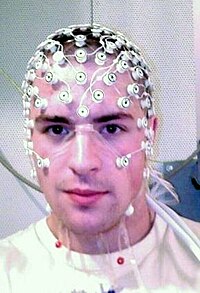
Photo from wikipedia
Background: Hypertonic saline (HS) and mannitol are hyperosmolar agents that are usually used to reduce intracranial pressure (ICP) and provide a satisfactory brain relaxation. The aim of the study was… Click to show full abstract
Background: Hypertonic saline (HS) and mannitol are hyperosmolar agents that are usually used to reduce intracranial pressure (ICP) and provide a satisfactory brain relaxation. The aim of the study was to perform a systematic review and meta-analysis to compare the efficacy of HS and mannitol on brain relaxation intraoperatively in patient undergoing craniotomies for supra-tentorial brain tumors. Methods: A systematic review and meta-analysis of randomized control trials. We included randomized control trials that compared equiosmolar HS and mannitol in supratentorial tumors craniotomies and reported at least one of the following outcomes: degree of brain relaxation, ICP, central venous pressure, mean arterial pressure, perioperative fluid input, urine output, Na+ levels, and K+ levels. We searched Medline, Cochrane Central Register of Controlled Trials, and Embase using MESH terms and keywords. The bibliographic references of included studies and trial registries were also searched. Results: Seven articles were included. The degree brain of relaxation was comparable across the two groups with slight tendency toward HS (RR = 1.13, 95% CI 0.99–1.29; P = 0.08). Mannitol was associated with significantly higher urine output (standardized mean difference [SMD] = −1.33, 95% CI −1.56–−1.10; P < 0.001). Na+ levels were higher in HS group (SMD = 1.47, 95% CI 0.86–2.09; P < 0.001). Mannitol was associated with non-significant decrease in CVP and increase fluid input (SMD = 0.42, 95% CI 0.00–0.85 and SMD = −0.18, 95% CI −0.37–0.02, respectively). Conclusion: Both HS and mannitol are associated with satisfactory brain relaxation with a non-statistically significant tendency for HS to achieve better relaxation scores with mannitol resulting in higher urine output while HS with higher Na+ levels.
Journal Title: Surgical Neurology International
Year Published: 2022
Link to full text (if available)
Share on Social Media: Sign Up to like & get
recommendations!